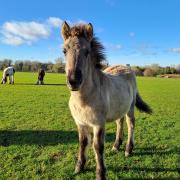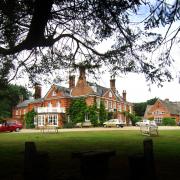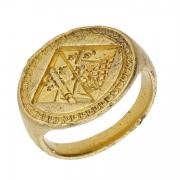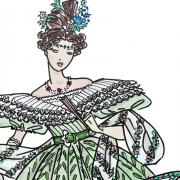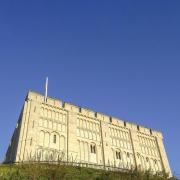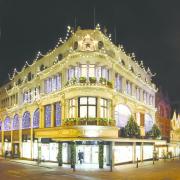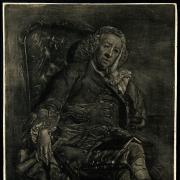Historian Chris Armstrong looks at the life of John Jarrold II, a conscientious committed Christian – and occasional curmudgeon
John Jarrold ll, (JJ) was responsible, with his eldest son, for bringing the family business to Norwich. He was a man of many parts – commercially he was a farmer, a ship-owner, a highly successful retailer, and, almost by accident, a printer and publisher, but there was much more to his story than just that of a successful businessman, and it’s these other aspects of his life with which this article is primarily concerned.
To be in a position to succeed he needed first to overcome considerable barriers. He had a difficult start to life. His father, also John Jarrold, owned a draper’s shop in Woodbridge, but he died when JJ was only two. His mother, who was estranged from JJ’s elder sisters, brought him to live in Norwich. The exact circumstances of this estrangement are obscure, but his mother was excommunicated by her church on the grounds that ‘the conduct you have assumed to your own daughters, is inconsistant (sic) with humanity and Christianity’ so it seems reasonable to infer that familial amity was unlikely to be restored. Neither was it by the time JJ’s mother died, when he was 12. So, at, a young age, and the only remaining male at a time when gender mattered, JJ had the full responsibilities of his family weighing on his shoulders.

Nominally under the protection of his maternal grandfather, Cranwell Coates of Gainsborough, his day to day care was in the hands of the executors of his mother’s will. One was a Norwich attorney by the name of Cooper. By this time there was a significant amount of capital available to the family, something in the order of £13,000, comfortably over £1,000,000 today. Perhaps JJ first became aware there was a problem with the financial state of the family when his sisters repeatedly told him that they were not receiving the income from Cooper which was their due. It transpired that Cooper, responsible for its investment, had embezzled the lot. It took nearly 30 years of work before JJ was able to recover most of the money.
Fortunately, his mother had been wiser in her other choice of executor, John Bidwell, who not only took JJ into his own home, but, when he reached the age of 14, arranged for him to be apprenticed to a grocer in Stalham, Obadiah Silcock. During his apprenticeship JJ made a very favourable impression on Silcock, who described him as ‘sober, honest, industrious and responsible’. JJ displayed particular skills in calculation and accounts, and, with a little capital still available was encouraged by Silcock to set up in a small way as a shawl maker with John Bidwell. Clearly, he was ambitious and entrepreneurial by nature. Silcock also took it upon himself to advise JJ on other matters and introduced him to a lawyer, John Lomas Cufaude, of Halesworth. JJ had already decided, probably wisely, against kicking the ball of Cooper’s dishonesty into the long grass of the Court of Chancery, and it was with the help and advice of Cufaude that JJ was able, eventually to recover most of the family fortune.

By the time his apprenticeship was finished, JJ’s financial situation had improved, both as a result of the efforts of Cufaude to start recovering some of the funds Cooper owed, but also by the sale of some property in Yorkshire which he had inherited from his mother’s family. He was able to apply the skills he had learned during his apprenticeship by returning to Woodbridge and opening a grocery and drapers shop there.
At 27, he married Hannah Hill, probably a family connection of Obadiah Silcock, and soon they started a family. Their first son, John James, was born in 1803, and their second, Samuel, two years later. JJ enjoyed a very strong relationship with his eldest son, with whom he was, later, to return to Norwich to open the store there. His relationship with his other children, especially Samuel, was more fraught.

Soon things got even worse when the disruption was followed by the preacher becoming the target for missiles thrown by the mob. Eggs were clearly too expensive a commodity to waste – the preferred object to throw was a hollowed-out turnip, filled with ‘the most detestable filth’. JJ took it upon himself to seek to resolve this issue, taking the matter first to the magistrates, who were unsympathetic to the complainants, and subsequently to the King's Bench, where the miscreants were fined and bound over to keep the peace. JJ himself bore much of the financial cost but it was a slow process and he decided to have his own home registered as a place of worship to protect the congregation.

It was while he was at Dallinghoo that JJ became involved with publishing and printing, backing the husband of his sister-in-law, Benjamin Smith, to set up as a printer. Smith eventually decided to change occupation and JJ was left with all the machinery, which he moved into the farm buildings and put to good use. He was a man of great conscience and he wanted to do good. Publishing gave him the opportunity. At the time literacy was gradually becoming more general and JJ produced numerous tracts designed to improve the learning, and the lot, of the aspiring working class. He was particularly concerned about what he saw as the deterioration in living standards of the labouring classes - he was a campaigner for social justice. He was still writing and publishing such tracts almost to his death, though by then he was writing anonymously. Another of his prime concerns was the slave trade – the Wisbech born and educated leading anti- slavery campaigner Thomas Clarkson was just one of a number of prominent abolitionists who were to visit Norwich at JJ’s invitation.
It wasn’t only by campaigning that JJ contributed to the common good. He was a generous benefactor to many local charities, especially the City Mission in Norwich – he wasn’t unduly modest about his financial contributions, claiming that he gave more to charities each year than he paid to his sons employed in the business. And this brings us to a less attractive aspect of JJ’s character – his relationship with his sons. With his eldest son, John James he enjoyed an excellent rapport. They came to Norwich together, reputedly bringing with them £7,000 (in excess of £500,000 today) to open the new store. But John James had an additional role – that of acting as buffer between his father and his brothers.

By 1830 all three younger sons, Samuel, William Pightling and Thomas were working in the business. JJ was unimpressed, especially with Samuel, of whom he wrote that he would benefit from ‘A proper degree of subordination, learning the art of obedience, and not to lord it over others’. He kept all three younger brothers on a very short leash, and paid them minimally. It was only at the instigation of John James that JJ was eventually persuaded to change the name of the business to Jarrold and Sons, and even then it was but a token gesture – he did not regard them as partners in the business, and described them, unfairly as it transpired, as ‘useless’.
Unfortunately the favoured eldest son died young, and the relationship between JJ and the others deteriorated to the extent that they were reduced to communicating in writing or through members of the staff. There were even cases of one generation countermanding the orders of the other – it must have been a confusing and frustrating time for the staff.
JJ refused to regard the surviving sons as partners in the business and, to their frustration, he used company funds to make personal investments. He regarded them as barely competent managers and criticised their decisions. Finally their frustration became such that they sought legal advice from Jacob Tillett, a lawyer respected by both generations. Tillett’s conclusion was that the boys were partners, and indeed had been entitled to the benefits of partnership for some time. A little grudgingly JJ accepted the inevitable and retired to live out his days in Coltishall, though he was prone to muttering about how his sons ‘derived all their wealth from me’, and to sound off about Samuel – his bete noire. This was something of an irony since in both his stubbornness and his attachment to the cause of total abstinence Samuel was very much his father’s son. Another irony was that a good deal of the wealth of these determined abstainers was derived from JJ’s maternal grandfather, who had made his fortune as a wine merchant.

Throughout his retirement JJ continued to do good works and to attend worship – as his hearing deteriorated arrangements were made by means of wires attached to a ‘cup’ in his pew to enable him to discern the words of the preacher – an early version of the hearing loops of today. He was a great advocate for social justice and was a generous benefactor to the poor, but there was just a touch of the curmudgeon about him.
A fuller account of the life and business of this remarkable character can be found in Chris Armstrong’s books Mustard, Boots and Beer (Larks Press 2014) and Anything from a Pin to an Elephant (Amberley 2016).






